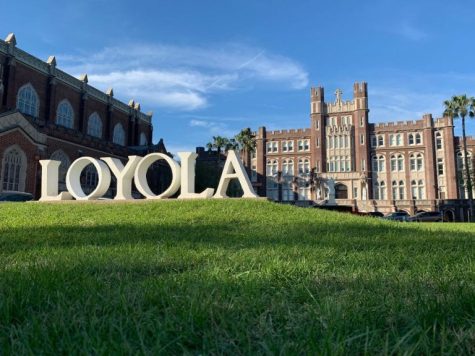The Talk
If Loyola intends to proactively stop sexual assaults on campus then they must acknowledge and meet the need for a comprehensive sexual health curriculum
We need to have a conversation about sex.
This conversation needs to arise not after another Loyola student is sexually assaulted or raped. Three such instances have been reported this semester alone.
This conversation deserves dignity. It deserves a more appropriate forum than sexual assault BOLOs from the Loyola University Police Department, Maroon-sanctioned investigative reports and opinion pieces and student organizations’ meetings and pamphlets. Although these mean well, rectifying the entirety of this issue is beyond the capacity of these organizations alone. They need administrative support and action.
It needs to happen because students should not have to assume sole responsibility for the consequences of rape — like pregnancy, sexually transmitted diseases or trauma — when they are robbed of their ability to choose whether or not to have sex.
This conversation needs to arise proactively and organically. It needs to take a form that is approachable, conversational and dialectical.
This conversation needs to arise because our community must proactively ensure that these traumas are not inflicted upon another one of its members ever again. This conversation should not solely consist of retroactively reporting what went wrong.
This conversation needs to happen because Pope Francis, the Jesuit leader of the Catholic Church, has made it a point to explore and condemn members of the clergy found guilty of sexually abusing minors. It must happen because Catholic universities must follow his lead and condemn perpetrators of sexual assaults against their student victims. We cannot let these assaults fall to the wayside. Our student victims deserve better than the continual sweeping of their sexual assaults under the rug — they deserve justice.
This conversation must happen because we must offer our students immediate access to comprehensive sexual health education and resources — like condoms and affordable STD testing — if we intend for them to understand the full logistics of healthy, consensual sex.
Even Pope Francis’ conservative predecessor, Pope Benedict XVI, made it a point to revisit the Church’s staunch anti-condom position during his time in the Vatican and indicated that the use of condoms is not morally reprehensible in the case of preventing the spread of HIV/AIDS.
But because of our conservative origins, our administration refuses to acknowledge this break with tradition and equip us with the tools necessary to prevent the spread of infection.
The culture of silence surrounding this subject on Loyola’s campus is pervasive and deeply ingrained. As a result, The Maroon must walk on eggshells when covering this subject. We must carefully formulate each of our arguments to ensure that we do not offend the traditional sensibilities of our university and its counterparts.
The tradition of ignoring the sexual lives of Catholic university students takes active strides in perpetuating the taboos and stigmas imposed on sexuality that are commonly affiliated with sexual health curriculum of Catholic institutions.
When addressing this issue in our editorial board meeting, members reminisced about prior encounters with Catholic sexual education in our separate primary and secondary schools. One member remembered masturbation being made out to be a habit practiced by serial killers. Another was taught that making out was a form of oral sex.
Sexual miseducation exists and sexual miseducation persists so long as Catholic universities elect not to properly and comprehensively educate their students. More specifically at our university, we preach that our purpose as an institution is to educate the totality of the human person, but why is there no place for sexuality in this mission?
It is wrong of us to assume that our students understand what constitutes as consent. It is optimistic maybe, but evidence found in the research of Marcus Kondkar, associate professor of sociology, shows ultimately that this idea is false — 37 percent of 500 Loyola students sampled in his study reported at least one act of unwanted sexual coercion in the past year.
A conversation about sex needs to happen because so long as we ignore consensual sex, a safe space for dialogue about what a healthy expression of sexuality looks like cannot and will not exist on this campus.
Pope Francis continually reaffirms sexuality as a healthy and necessary part of the human person. He takes strides to unmake taboos attributed to sexuality. He draws attention to religious texts claiming that the human body is sacred. He strives to educate Catholics about how to incorporate principled expressions of sexuality into their lives.
However, he emphasizes the importance of consent in these sexual relationships, hence his continual condemnation of sexual abuse on behalf of members of the clergy. He makes strides to compensate for these travesties by asking for forgiveness from victims.
Loyola must make amends to its student victims and actively work towards the creation of a safe, inclusive campus for all.
In Human Sexuality: A Catholic Perspective for Education and Lifelong Learning, United States Bishops state that sexuality is a fundamental means of relating to our selves, other people and God. It further explains that since God bestowed us with our sexuality, it must be treated like the gift that he intended for it to be.
We believe that if sex is something we are not supposed to be scared of, then we should not limit conversations about it to instances when it takes a scary turn.
For Pope Francis’ synod in October, where he is expected to openly address contraception, marriage and divorce, he is requesting input from Catholic lay people, as well as theologians and bishops. Perhaps it would be wise for Loyola to consider operating in a similar fashion and begin addressing the needs of its student body by conversing with them about precisely what those needs are.
We are not proposing that the university radically revise their stance on pre-marital sex and contraception. We are asking, quite modestly, that they meet us in the middle.
Take Georgetown University for example. Georgetown — a leading Jesuit research university in Washington D.C. — allows a widely known student organization to distribute condoms to its on-campus residents. Their administration protects their own interests and the interests of their students by choosing to neither condone nor condemn this distribution. In this way, everyone’s best interests are protected.
We recognize that some of what we are asking for in this editorial will not be fulfilled due to our Catholic origins. But we do demand an explanation from our administration as to why preserving the interests of traditional Catholic dogma is more of a priority to them than meeting the tangible, explicit needs of the student body they are intended to serve.
We are not proposing that this is the best and only solution. We recognize that we are merely a student-run newspaper and that we are not equipped to offer a comprehensive strategic plan for the elimination of sexual assault on our campus.
But The Maroon is the mirror and lamp of the Loyola community. We have continually cast a light on the problems our community tries to hide in the dark, and today we are merely asking that the university come face-to-face with itself in the mirror and recognize their personal duty, responsibility and obligation to fix them.

Lauren is an English writing sophomore. She has previously worked on The Maroon as an editorial assistant, a staff writer, and as a copy editor. In her...










